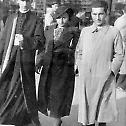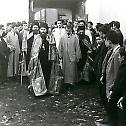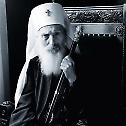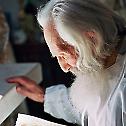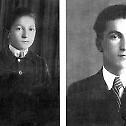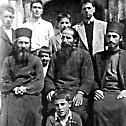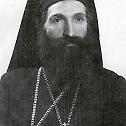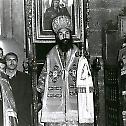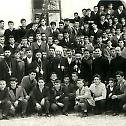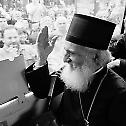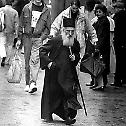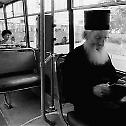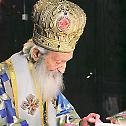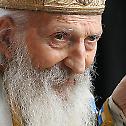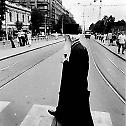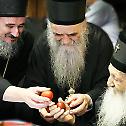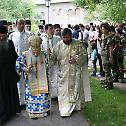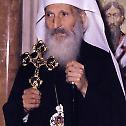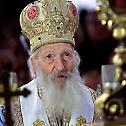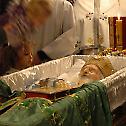Patriarch Pavle of Serbia
His Holiness Patriarch Pavle (Stojčević ) of Serbia (September 11, 1914-November 15, 2009) lived a long life full of Christian asceticism.
His simplicity, meekness, and humility, combined with his strict asceticism inspired the love that millions of believers had for him during his lifetime. Many already considered him a living saint, and after his repose, faith in the holiness of Patriarch Pavle is growing ever more and strengthening in the hearts of the faithful. Today marks the 10th anniversary of his falling asleep in the Lord.
Biography of Patriarch Pavle
The spiritual leader of the Serbian Orthodox people was born September 11, 1914 to Stefan and Ann Stojcevic, in the village of Kucani, in the county of Donji Miholjac, in Slavonija. His baptismal name was Gojko.
The Patriarch graduated with high honors from the Fourth Male Gymnasium (high school) in Belgrade. He did postgraduate studies at the Orthodox Theological Faculty at the University of Athens from 1955 to 1957. During his stay in Greece, he studied the New Testament and developed an expertise in liturgics, which resulted in the Patriarch becoming one of the most prolific liturgical writers in the Serbian Church. For his patient and prominent work in the field of theology, the Theological Faculty of the Serbian Orthodox Church awarded His Holiness an Honorary Doctorate of Divinity.
From 1944 to 1955, he was a monastic of Raca Monastery performing different disciplines. During the 1950/51 academic year, the then-Hierodeacon Pavle was appointed a lecturer at the Prizen Seminary, a position which he retained until his election to the Patriarchal Throne.
He was tonsured a monastic in 1948 and that same year he was ordained a hierodeacon. In 1954, he was ordained a hieromonk and elected to the rank of protosingelos. He was elevated to the rank of archimandrite in 1957 by Bishop Emilian of Slavonija. On May 29, 1957, the Holy Assembly of Bishops elected Archimandrite Pavle as Bishop of Raska-Prizen.
From that day to the present, he has faithfully shared in the plight of his suffering people. Bishop Pavle wrote and warned of the present exodus of Serbs from Kosovo, the attacks of the Albanians on Serbian monasteries, the rape of nuns, and terrorizing of pedestrians, the desecration of Serbian cemeteries and overall suffering of the Orthodox in Kosovo and in Metohija. In 1989, the then Bishop Pavle was personally beaten by several Albanian youths in Kosovo. The extent of his injuries required nearly 3 months of hospitalization. However, in the spirit of Christian forgiveness, he refused to press charges.
It is not without reason that Patriarch Pavle has been referred to as a "saint who walks." The simplicity of his lifestyle and his personal humility have found favor by all of those who are familiar with this virtuous man. All of the Bishops of the Serbian Orthodox Church have an automobile, which they use to travel through their dioceses. The one exception has been Patriarch Pavle. When asked why he never obtained an automobile, he replies: "I will not purchase one until every Albanian and Serbian household in Kosovo and Metohija has an automobile."
His Holiness has published Devich, The Monastery of St. Joanikije of Devich (1989) and Questions and Answers to the Church Reader (1988). For the past 20 years, he has been responsible for the column in the Glasnik of the Serbian Patriarchate known as Questions and Answers, dealing with liturgical and sacramental questions. Through his efforts the Holy Synod published the new version of Srbljak in 1968. He also coordinated the reproduction of liturgical studies Christian Feasts by M. Skabalanovich, published originally in Kiev in 1915 in 6 volumes. The most monumental contribution of H. H. Patriarch Pavle was the translation of the New Testament published in 1984 under his supervision. This was the first official Serbian translation of the New Testament approved by the Serbian Orthodox Church. If all Bishop Pavle’s works were published, there would be thousands of pages and many volumes. Patriarch Pavle exemplifies simplicity in his lifestyle and is the embodiment of humility and personal holiness, a most worthy helmsman to guide the "Ship of the Church" in these troubled times.

